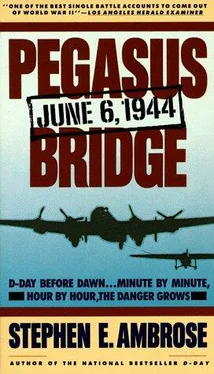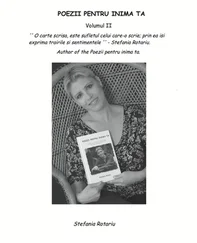Stephen Ambrose - Pegasus Bridge
Здесь есть возможность читать онлайн «Stephen Ambrose - Pegasus Bridge» весь текст электронной книги совершенно бесплатно (целиком полную версию без сокращений). В некоторых случаях можно слушать аудио, скачать через торрент в формате fb2 и присутствует краткое содержание. Жанр: История, на английском языке. Описание произведения, (предисловие) а так же отзывы посетителей доступны на портале библиотеки ЛибКат.
- Название:Pegasus Bridge
- Автор:
- Жанр:
- Год:неизвестен
- ISBN:нет данных
- Рейтинг книги:5 / 5. Голосов: 1
-
Избранное:Добавить в избранное
- Отзывы:
-
Ваша оценка:
- 100
- 1
- 2
- 3
- 4
- 5
Pegasus Bridge: краткое содержание, описание и аннотация
Предлагаем к чтению аннотацию, описание, краткое содержание или предисловие (зависит от того, что написал сам автор книги «Pegasus Bridge»). Если вы не нашли необходимую информацию о книге — напишите в комментариях, мы постараемся отыскать её.
Pegasus Bridge — читать онлайн бесплатно полную книгу (весь текст) целиком
Ниже представлен текст книги, разбитый по страницам. Система сохранения места последней прочитанной страницы, позволяет с удобством читать онлайн бесплатно книгу «Pegasus Bridge», без необходимости каждый раз заново искать на чём Вы остановились. Поставьте закладку, и сможете в любой момент перейти на страницу, на которой закончили чтение.
Интервал:
Закладка:
He was a man of the most extraordinary energy, so much energy that he could not burn it off even with daily ten-mile runs and twenty miles of walking the beat. What could burn it off was the mental effort required at every corner, past every tree, literally with every step. Expecting only the unexpected, he was always on his own, with no one to turn to for reinforcements or advice. To be so intense, for such a long period of time, through the dark hours, brought Howard to a full use of all his gifts and powers. He was a creature of the night; he loved the challenge of darkness.
Howard stayed with the police until after the war began. On October 28,1939, he and Joy were married. On December 2, he was recalled for duty as a full corporal with the 5th Battalion King's Shropshire Light Infantry, and within two weeks he was a sergeant. One month later he was Company Sergeant Major. In April, he became an Acting Regimental Sergeant Major, so he jumped from corporal to regimental sergeant major in six months, something of a record even in wartime. And in May, his Brigadier offered him a chance at a commission.
He hesitated. Being Regimental Sergeant Major meant being the top man, responsible only to the commanding officer, the real backbone of the regiment. Why give that up to be a subaltern? Further, as Howard explained to his wife, he did not have a very high opinion of the incoming second lieutenants and did not think he wanted to be a part of them. Joy brushed all his objections aside and told him that he absolutely must try for the commission. Her reaction ended his hesitance, and he went off to OCTU - Officer Cadet Training Unit - in June, 1940.
On passing out, he requested the Ox and Bucks, because he liked the association with Oxford and he liked light infantry. His first posting was to the Regimental Depot at Oxford. Within a fortnight he feared he had made a terrible mistake. The Ox and Bucks were 'a good county regiment' with a full share of battle honours, at Bunker Hill, in the Peninsula, at the Battle of New Orleans, Waterloo, and in the Great War. Half the regiment had just come back from India. All the officers came from the upper classes. It was in the nature of things for them to be snobbish, especially to a working-class man who had been a cop and had come up from the ranks. In brief, the officers cut Howard. They meant it to be sharp and cruel, and it was, and it hurt.
After two weeks of the silent treatment, Howard phoned Joy, then living with her family in Shropshire. 'You'd better plan to move here', he told her. 'Because it's just horrible and I need some encouragement or I am not going to stick it. I don't have to put up with this.' Joy promised him she would move quickly.
The following morning, on the parade ground, Howard was putting four squads through different kinds of training. He already had his men sharp enough to do some complicated manoeuvres. When he dismissed the squads, he turned to see his colonel standing behind him. In a quiet voice, the colonel asked, 'Why don't you bring your wife here, Howard?' It was a sure indication that the C.O. wanted to keep him in Oxford and not follow the normal routine of being posted to a Battalion. Within a week, they had found a flat in Oxford and John had been accepted by his fellow officers.
Soon he was a captain with his own company, which he trained for the next year. At the beginning of 1942, he learned that a decision had been taken for the 2nd Battalion of the Ox and Bucks to go airborne in gliders. No one was forced to go airborne; every officer and trooper was given a choice. About 30 per cent declined the opportunity to wear the red beret, and another 20 per cent were weeded out in the physical exam. It was meant to be an elite regiment. The sergeant major came to the Ox and Bucks specially posted from the outside, and he was everything a regimental sergeant major from the Guards' Honour Regiment should be. Wally Parr speaks of the man's overpowering personality: 'That first day', says Parr, 'he called the whole bleeding company together on parade. And he looked at us, and we looked at him, and we both knew who was boss.'
Howard himself had to give up his company and his captaincy to go airborne, but he did not hesitate. He reverted to lieutenant and platoon leader in order to become an airborne officer. In three weeks, his colonel promoted him and gave him command ofD Company. Shortly after that, in May of 1942, he was promoted to major.
The men of D Company - half from the original Ox and Bucks, half from volunteers drawn from every branch of the army -came from all over the United Kingdom, and from every class and occupation. What they had in common was that they were young, fit, eager to be trained, ready for excitement. They were the kind of troops every company commander wishes he could have.
Howard's platoon leaders also came from different backgrounds. Two were Cambridge students when they volunteered, and one was a graduate of the University of Bristol. But the oldest lieutenant, at age twenty-six, was Den Brotheridge, who, like Howard, had come up from the ranks. Indeed, Howard had originally recommended Den, then a corporal at the Regimental Depot, for OCTU. His fellow platoon leaders were a bit uneasy about Den when he first joined up; as one of them explained, 'He wasn't one of us, you know'. Den played football rather than rugby. But, the officer immediately added, 'You couldn't help but like him'. Den was a first-class athlete, good enough that it was freely predicted he would become a professional football player after the war.
Captain Brian Friday was Howard's second-in-command. Six feet tall, a quiet steady type, Friday was ideal for the job. He and Howard hit it off, helped by the fact that Friday's father had also been in the Oxford Police force. Friday himself had been in the motor car trade. He was in his mid-twenties. Lieutenants Tod Sweeney and Tony Hooper were in their early twenties; Lieutenant David Wood was all of nineteen years old, fresh out of OCTU. 'My gracious', Howard thought to himself when Wood reported, 'he is going to be a bit too young for the toughies in my company'. But, Howard added, 'David was so keen and bubbling with enthusiasm I thought, "well, we've got to make something of him". So I gave him a young soldier platoon with mature NCOs.'
Sweeney describes himself and his fellow subalterns as 'irresponsible young men. Life was very light-hearted, there was a war on, lots of fun for us. John was a dedicated and serious trainer and we were rather like young puppies he was trying to train.'
Brotheridge provided enthusiasm and humour for the group. He would gather the platoon leaders together, then read to them from Jerome K. Jerome's Three Men in a Boat. They could scarcely get through a sentence without breaking down in peals of laughter. Weekend evenings they would drop into the lobby of the local hotel, where a good number of'dear old ladies from London, who wanted to escape the bombing, had taken up residence for the duration'. Den and his cohorts would sit properly enough, but then Den would start whispering orders. The grandfather clock was the objective - David was to sneak behind the sofa, climb over the bar, go through the kitchen, and attack the clock from the rear; Tod should leap out the window, dash around to the door, end charge in to attack from the side -and so on. Then Den would shout, 'Go', and the ladies watched aghast as these young men dashed about.
Howard was pleased with his company, officers and men. He especially liked having so many Londoners in it. The regiment moved to Bulford, where D Company was given a spider block, near the barracks but separate from it. So, Howard notes, 'right from the first there was an atmosphere of D Company being on its own'. He set out to make it into both a family and a first-class combat unit.
In North Africa, Hans von Luck was fighting in the only war he ever enjoyed. As commander of the armed reconnaissance battalion on Rommel's extreme right (southern) flank, he enjoyed a certain independence, and so did his British opposite number. The two commanding officers agreed to fight a civilised war. Every day at 5 p.m. the war shut down, the British to brew up their tea, the Germans their coffee. At about 5:15, von Luck and the British commander would communicate over the radio. 'Well', von Luck might say, 'we captured so-and-so today, and he's fine, and he sends his love to his mother, tell her not to worry'. Once von Luck learned that the British had received a month's supply of cigarettes. He offered to trade a captured officer for one million cigarettes. The British countered with an offer of 600,000. Done, said von Luck. But the British prisoner was outraged. He said the ransom was insufficient. He insisted he was worth the million and refused to be exchanged.
Читать дальшеИнтервал:
Закладка:
Похожие книги на «Pegasus Bridge»
Представляем Вашему вниманию похожие книги на «Pegasus Bridge» списком для выбора. Мы отобрали схожую по названию и смыслу литературу в надежде предоставить читателям больше вариантов отыскать новые, интересные, ещё непрочитанные произведения.
Обсуждение, отзывы о книге «Pegasus Bridge» и просто собственные мнения читателей. Оставьте ваши комментарии, напишите, что Вы думаете о произведении, его смысле или главных героях. Укажите что конкретно понравилось, а что нет, и почему Вы так считаете.




![Stephen Ambrose - Citizen Soldiers [Condensed]](/books/346737/stephen-ambrose-citizen-soldiers-condensed-thumb.webp)




